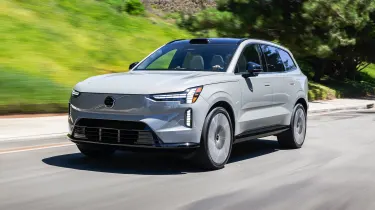
Full self-driving cars gained fresh impetus earlier this year when the UK government passed the new Automated Vehicles Act, but safety experts from Volvo have questioned the viability of the technology and its potential real-world use.
Speaking to Auto Express, Claudia Zarra, a safety manager at Volvo, denounced the feasibility of full self-driving cars. “Fully autonomous car safety is dependent on the conditions. We need a perfect environment for it to meet our standards,” Zarre said, referring to road markings, signs and general road conditions. “Volvo full self-driving won’t arrive until we know it’s 100 per cent safe,” she added.
The company unveiled a fully autonomous car, the 360c, way back in 2018 as a rival to not only cars, but also public transport. Since then, Volvo’s all-electric flagship, the EX90, has been launched, and while early models don’t feature Level 3 hands-free motoring, this autonomous technology will soon arrive via a Lidar pod on the new car’s roof.
Further developments on Volvo’s autonomous tech don’t sound likely, according to Zarre, although we may yet see the company pioneer the technology through its commercial vehicle business. Volvo Autonomous Solutions was set up in 2020 to provide self-driving transport, and earlier this year we saw Volvo unveil its first production-ready, fully autonomous lorry.
The Swedish company is not alone in developing such tech. Tesla recently announced its self-driving Robotaxi, which comes without a steering wheel. The compact two-seater was claimed to have a provisional launch date of 2027, although such a car would currently not be legal on UK roads.
